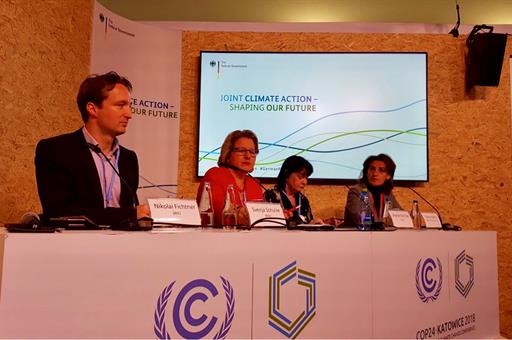At the Climate Summit in Katowice (Poland)
Teresa Ribera underlines importance of Fair Transition policies in the essential decarbonisation process at COP24
News - 2018.12.12
At a meeting on the issue within the framework of the 24th Conference of the Parties of the United Nations Framework Convention on Climate Change (COP24) in Katowice, she explained that the Government of Spain will soon present its National Fair Transition Strategy - one of the first regulatory frameworks on this issue to be developed anywhere in the world.
"I firmly believe in the ability of an ecological transition to reduce unemployment, create new opportunities and end inequality. To that end, it is important to make efficient use of public policies that will enable us to get ahead of ourselves and correct the negative impacts that this necessary process may cause in certain sectors and territories", said the Spanish Minister for Ecological Transition.
"Not leaving anyone behind requires short-term realities to be addressed, but a fair transition requires frameworks that can guarantee employment and quality of life in all territories both in the medium and long term", she added.
The National Fair Transition Strategy will be the instrument used to enable the identification and adoption of measures that can guarantee fair and solidarity-based treatment for workers and territories affected by the transition to a low greenhouse gas emissions economy, streamlining the opportunities to create economic activity and jobs tied to that ecological transition.
To draw up this strategy, the Government of Spain is following the guidelines agreed by the International Labour Organisation (ILO). Among other issues, the framework will design industrial, research and development, economic activity and job promotion, and professional training policies, in order to ensure that the transition to a low-carbon economy is fair and socially beneficial.
Fair transition agreements
In order to anticipate the adverse effects that may arise in certain territories, the strategy will provide a formula for Fair Transition Agreements. The goal is to support those economic initiatives deemed appropriate for the various socio-economic and labour contexts of the affected regions.
Under these agreements, various stakeholders will be allowed to participate in territorial development projects: companies, trade unions, universities, education centres, non-governmental environmental organisations and associations, and the various public authorities.
Following a report from the Ministry of Work, Migration and Social Security and the Ministry of Industry, Tourism and Trade, the agreements will be signed between the Ministry for the Ecological Transition and other public authorities, in particular the local authorities in the geographic areas at risk to the adverse effects from the transition to a low-carbon economy.
Among other things, the agreements will include a vulnerability status assessment on the geographic area and groups affected, as well as commitments from the parties, including the companies benefiting from the transition support measures. They will also include fiscal, financing, employment, social protection and training activity measures to encourage the adaptation of workers to the objectives reflected in the agreement and a schedule for the uptake of measures with measurable goals and tracking mechanisms.
The mining agreement, a first step
In October, the Government of Spain and the coal mining sector signed an agreement for a fair transition and sustainable development of mining regions. This agreement responds to the social and economic consequences that will arise following the compulsory coal mine closure at the end of 2018 in compliance with EU regulations. The Spanish mining sector already underwent a significant transformation during the 1990s, going from 45,000 miners to approximately 2,000 at present.
The agreement contains three types of measures, all aimed at laying the groundwork for a fair transition by workers and territories in regions especially involved in the decarbonised economic future towards which we must make progress on. Firstly, it provides for early retirements and incentivised redundancies for the employees of mining companies facing closure in compliance with EU regulations.
Secondly, a training and labour insertion support plan will be designed for mining company employees, including those who work for subcontracted companies, to help them adapt to the new employment needs that will emerge in the new productive environment.
Finally, the agreement provides for a fund of 250 million euros over a period of five years aimed at supporting business and development initiatives in the affected regions to achieve structural transformation, economic recovery and social well-being.
A specific action plan will be launched for the regions affected, including a mining operation restoration plan, a renewable energies and energy efficiency development plan, and the chance for local or regional authorities to sign fair transition agreements with the Government.
Non official translation





